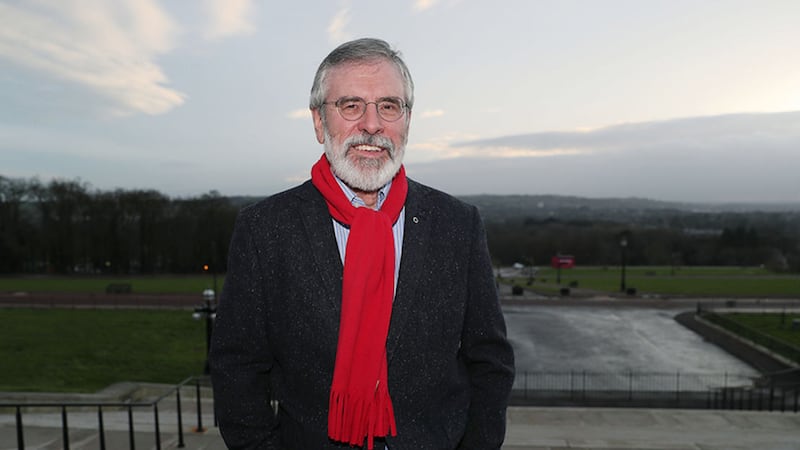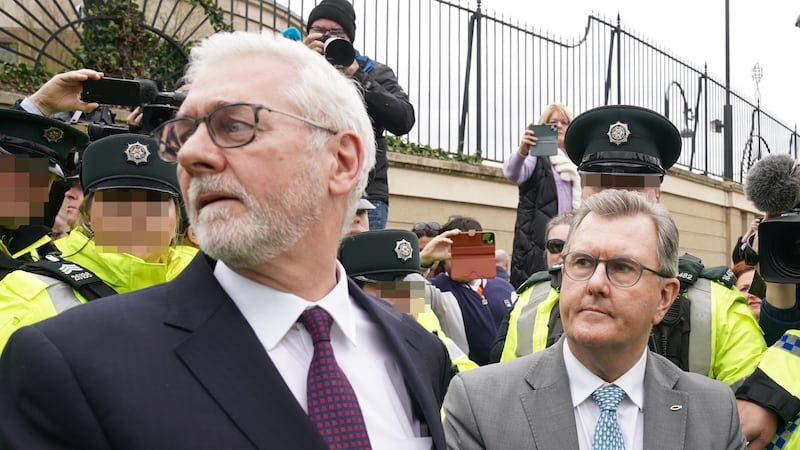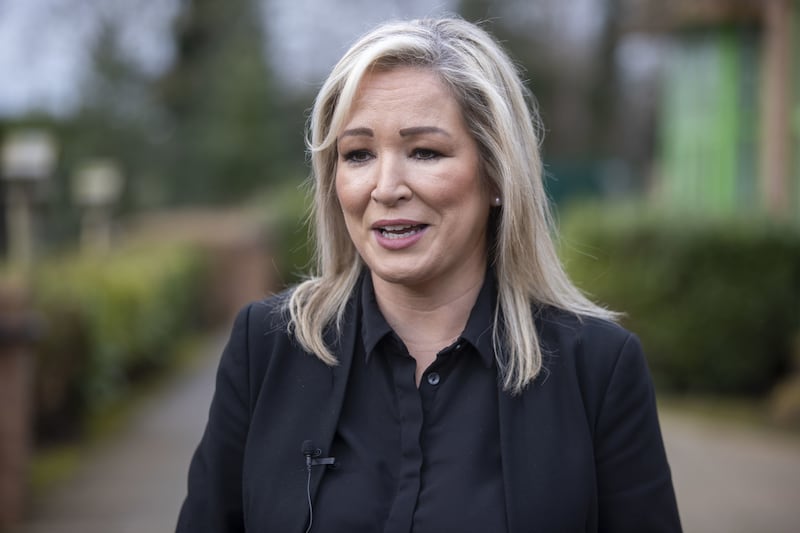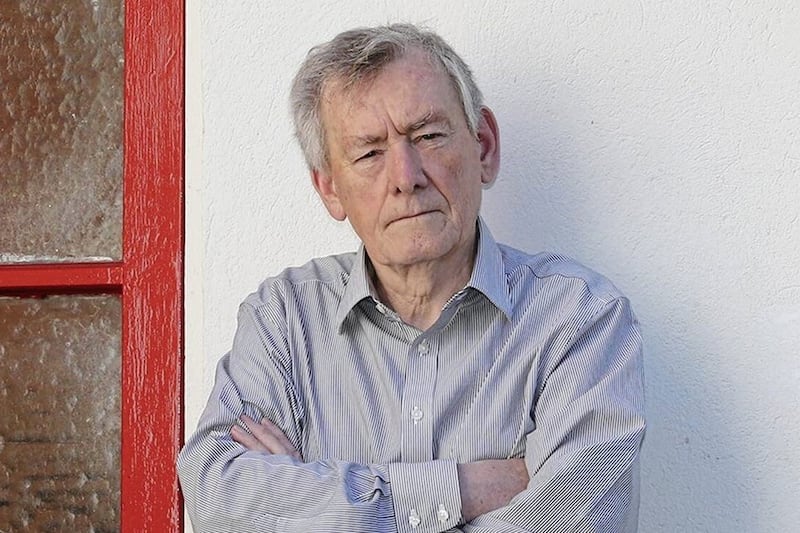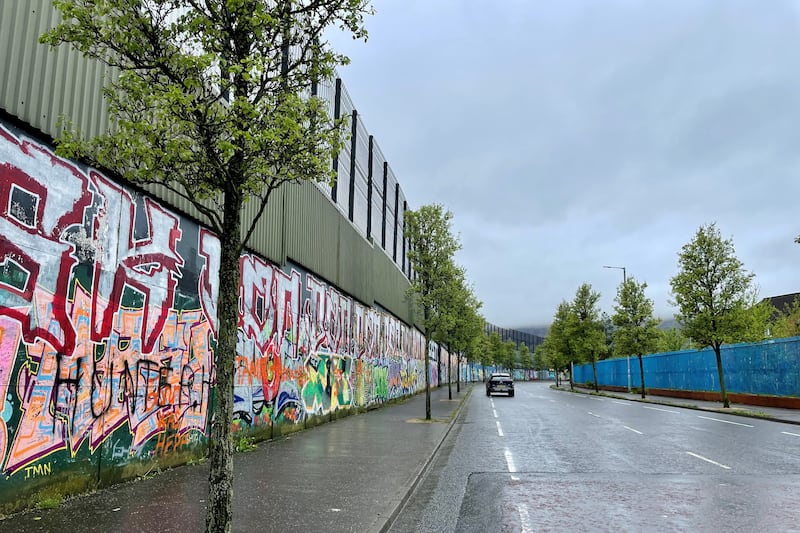Outgoing Sinn Féin President Gerry Adams has insisted he does not care how history will judge him.
As he prepares to hand over the reins to Mary-Lou McDonald, the 69-year-old barman turned republican leader said he accepts that some people will detest him and others will admire him for his actions throughout his political life.
In interview with @PA @GerryAdamsSF asks: "Why do we want English people to govern us? Why do we want anybody but ourselves to govern us?" pic.twitter.com/H40jvSvOds — Deborah McAleese (@DeborahMcAleese) February 9, 2018
He said he does not care what he is remembered for because he believes he did the best he could.
"I don't mind. If I thought about it very deeply those people who detest me will continue to detest me. Those people who admire me will continue to admire me.
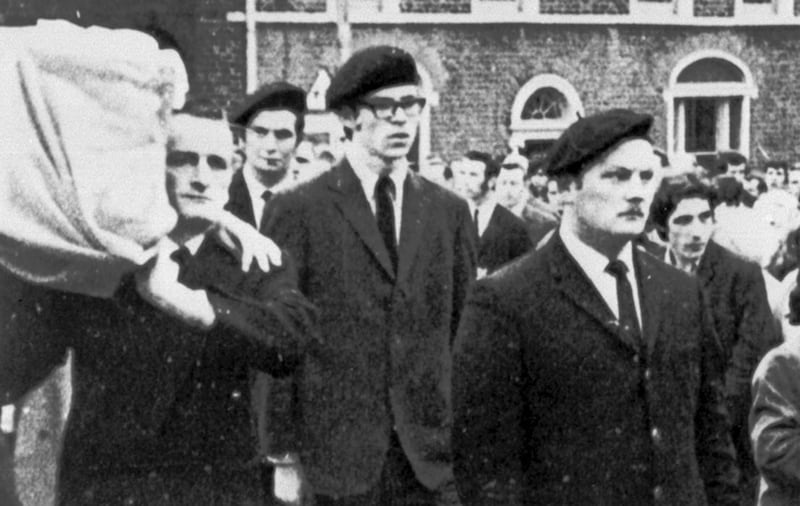
"All I did in the course of the job, I was doing my best. And I think that is all we can do. I am satisfied I have done my best," he said.
Mr Adams, who has always denied being a member of the IRA, has been both hailed as a peacemaker and vilified as a terrorist.
Reflecting upon the thousands of people killed and injured during the Troubles, he said it was something he regrets.
"I regret the fact anyone was killed, particularly those who were killed by the IRA. Of course I do.
"All victims deserve the truth and justice and their families deserve that.
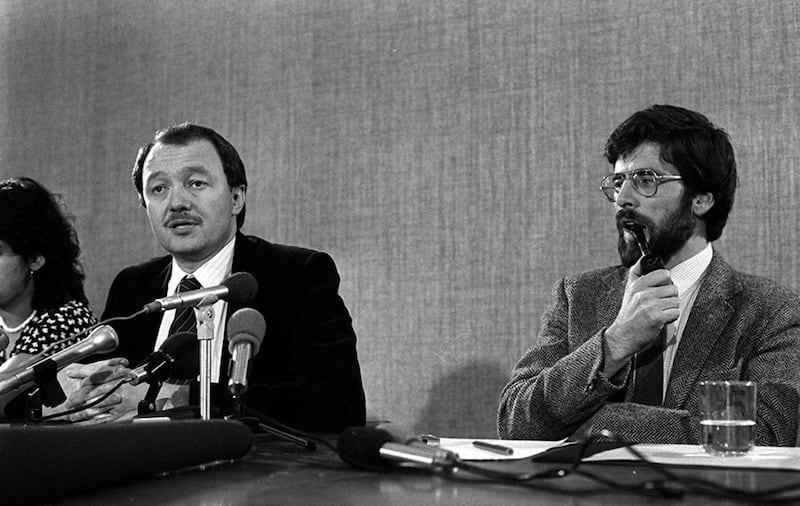
"People will judge me whatever way they want to judge me and I accept that. I have been very moved by the generosity and grace of some people who were really hurt in the conflict.
"That has been quite inspirational, to meet people who were prepared to set aside that hurt for the common good.
"What we all have to do is make sure it never happens again," he said.
Mr Adams has said he regrets that it took until 1994 for the first IRA ceasefire.
He said he first began dialogue with Catholic priest Father Alec Reid, who was considered pivotal to the peace process, as far back as 1977.
But it was not until 1988 that Fr Reid brokered Mr Adams' dialogue with the then SDLP leader John Hume, which led to the IRA ceasefire six years later.
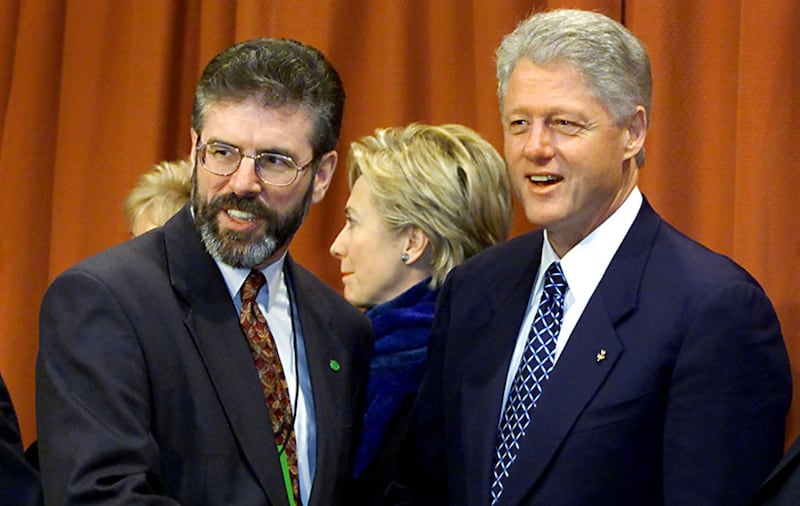
The Sinn Féin TD said he regretted the deaths and injuries caused during those years.
"I regret that it took so long and that those who would condemn, denounce, use moral denunciations as a subterfuge for just not talking, therefore it took almost from 1976/77 to 1994 before there was the first cessation.
"That's an awful long time and a lot of people were killed or injured and traumatised in between."
He said that when he and Mr Hume eventually met in 1988 they "did what is just the imperative, the primacy of any process (which) is to talk, to listen."
"And out of that came the Hume/Adams principles," he added.
Mr Adams criticised past British prime ministers who refused to talk to Sinn Féin during the Troubles. He called them "the stupid ones."
"Probably the toughest (prime ministers to deal with) were the stupid ones who wouldn't talk.
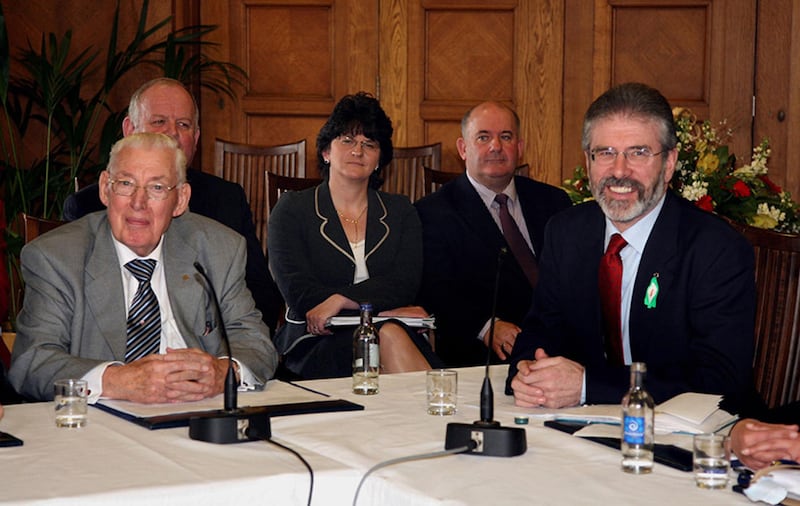
"If you consider that I was an elected official along with others and other elected officials wouldn't talk to us and the British prime ministers handed over the future ... to generals, to military bosses, to people who brought in collusion, internment, shoot to kill and all the rest of it and just militarised the situation with all the awful consequences of that."
Mr Adams said that John Major had the chance to help bring peace to the north but failed to do so, while Tony Blair seized the opportunity "with both hands".
He also said that while he admired Mr Blair for helping to bring about the Good Friday Agreement he believed the former prime minister had done "dreadful" things in Iraq and that he and the late Martin McGuinness had warned him against going to war.
"John Major was given an opportunity for peace on a plate and he let the plate drop. Tony Blair had the good sense when he was given the same opportunity that he seized it with both hands.
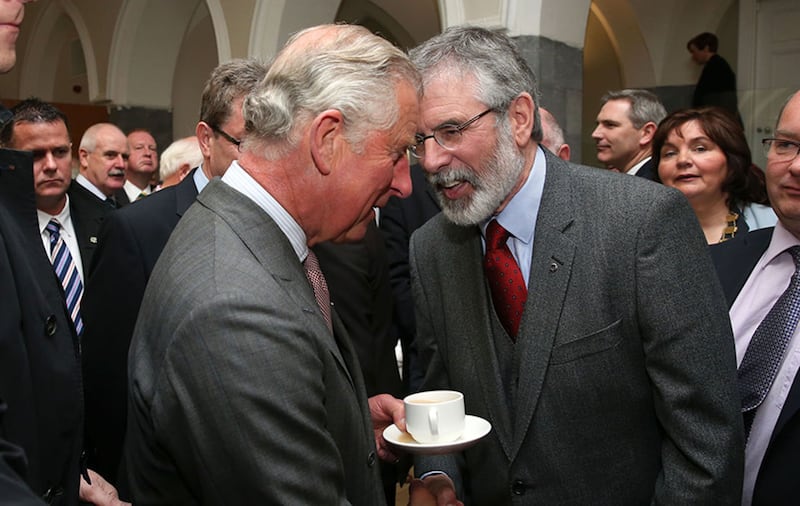
"But he himself has said reflectively that he couldn't have done what he did if it hadn't been in the early sort of glow of the first early phases of government," he said.
"(Blair) helped along with the rest of us to author the Good Friday Agreement. Now he did dreadful things in Iraq and that was folly.
"Myself and Martin McGuinness warned him against the consequences of going into anyone else's country with military force. We actually said to him 'look at what's happened here'. Unfortunately we were right," added Mr Adams.
Mr Adams also said the idea of Irish unity has become more prevalent since Britain decided to leave the European Union.
He said that since Brexit people on the island of Ireland have been reminded of the benefits of the last 20 years without a hard border between Northern Ireland and the Republic.
"The consequence of Brexit is that people have just been reminded that for the last 20 years we have just practically had a single island economy, the border has ceased to be the intrusive, in your face, structure - it is still there of course and we want rid of it in any form - but people have just been reminded how good that has been.
"I'm not saying there is a direct correlation between Brexit and Irish unity, and in fact I think those of us who want a united Ireland need to be very careful that we are not accused of trying to exploit Brexit.
"But I just think the notion of Irish unity, in terms of public debate, is now much more prevalent.
"We want to see a referendum on Irish unity as part of the Good Friday Agreement. We are going to continue to campaign for that and we also want to win that."
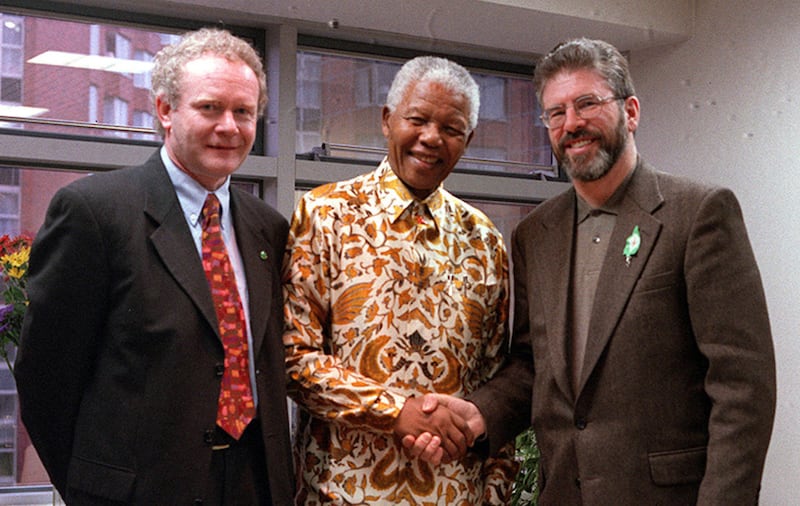
Mr Adams said however that he does not believe a united Ireland is inevitable.
"You have to work for it and you have to convince people. But we now have a very peaceful and democratic way of achieving it," he said.
Mr Adams added: "That means persuading people that the best way for all of us on this island is if we govern ourselves. Why do we want English people to govern us? Why do we want anybody but ourselves to govern us?"
He said that at the "very core" of Irish unity was "uniting orange and green."
"(It's) about harmony and peace between those two big traditions. And as we become more multicultural it is also about making space for all of those other folks out there who wouldn't be part of the orange and green tradition. It is about trying to build a tolerant, respectful, citizens based, rights centred society," said Mr Adams.
When asked how he would judge himself, Mr Adams replied: "To tell you the truth, I haven't thought of that.
"I am a very good dancer, I sing extremely well, I am a half-decent cook, I have written a wee bit, I like walking, but I'm comfortable in my own skin and I am surrounded by some wonderful people, a great family, my wife, people who love me.
"The most important thing in life is friendship and the most important thing you can give to anyone is time. So I am blessed with friends and all this time," he said.
Mr Adams added that he felt "blessed" to still be alive, having survived a number of assassination attempts.
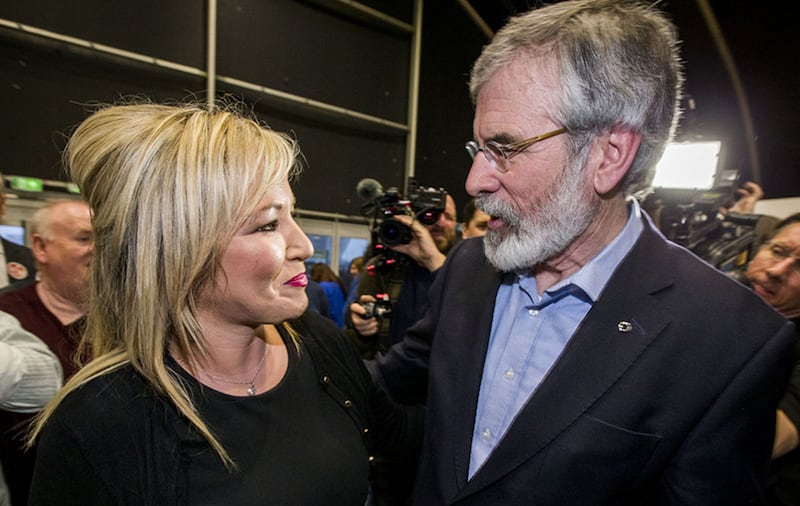
He was once shot in the neck, shoulder and arm as a number of gunmen opened fire on his car in 1984. He also had a hand grenade thrown into his home.
"I have escaped a number of attempts to kill me and so on. I have been blessed by some very incompetent assassins, so there are lots of good things in life," he said.
On Saturday, Mr Adams will pass on the Sinn Féin presidency after more than 34 years in the post.
Around 2,000 delegates are expected to gather at the RDS in Dublin for the ratification of Dublin Central TD Ms McDonald as his successor.
Sinn Féin's northern leader, Michelle O'Neill, will be proposed for the vice-president position.
The life of outgoing Sinn Féin leader Gerry Adams
By Deborah McAleese, Press Association
Gerry Adams is preparing to hand over the reins to Mary-Lou McDonald.
- 1948: Gerry Adams was born in Ballymurphy, west Belfast.
- 1972: Adams was interned - imprisoned without charge - under the controversial Special Powers Act. He was released later that year to take part in ceasefire talks with the British government. The talks failed and were followed by the Bloody Friday murders in Belfast.
- 1977: He was acquitted of IRA membership.
- 1981: At the height of the IRA hunger strikes he played a pivotal role in the Fermanagh by-election in which Bobby Sands became an MP.
- 1983: Adams became MP for West Belfast and replaced Ruairi O Bradaigh as president of Sinn Fein.
- 1984: He survived a loyalist paramilitary gun attack in Belfast.
- 1988: Adams and former SDLP leader John Hume entered secret peace talks, eventually leading to the peace process.
- 1993: Following the Shankill bombing, Adams carried the coffin of IRA man Thomas Begley, who died when the bomb exploded prematurely.
- 1994: IRA ceasefire announced.
- 1998: The Good Friday Agreement was signed. Adams stayed out of the powersharing executive.
- 2003: Powersharing collapsed.
- 2006: Following extensive negotiations, Adams and the late DUP leader Ian Paisley signed up to the St Andrews Agreement, leading to a DUP Sinn Fein Stormont coalition.
- 2011: Adams resigned as West Belfast MP to run for election in the Republic of Ireland. He was elected as a TD (member of the Irish Parliament).
- 2013: Adams gave evidence against his brother Liam Adams, who was on trial at Belfast Crown Court accused of raping and sexually abusing his daughter. Liam Adams was jailed for 16 years.
- 2014: The Sinn Fein leader was arrested by PSNI detectives investigating the 1972 murder of Belfast mother-of-10 Jean McConville, who was abducted and murdered by the IRA in 1972. After four days Adams was released without charge.
- 2017: Martin McGuinness quit as Northern Ireland's deputy first minister, leading to the collapse of powersharing. He died two months later. In November Adams announced his intention to stand down as president of Sinn Fein after 34 years.
- 2018: Mary Lou McDonald was announced as president elect. She will officially take over on Saturday.
